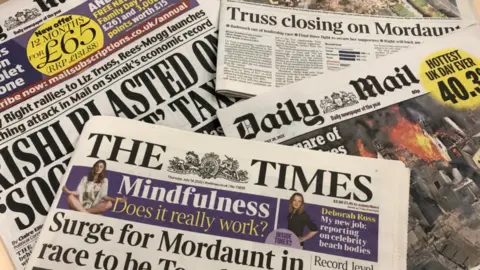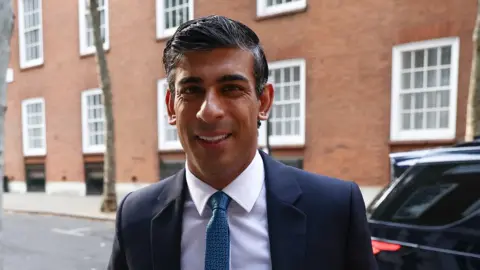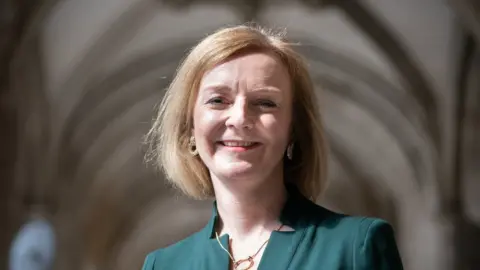Tory leadership: Why newspapers matter in race to be next PM

 BBC
BBCThe Conservative leadership contest will be less of a social media election than recent plebiscites because it will be determined by an electorate who are still heavily influenced by newspapers.
Through the 2015, 2017, and 2019 general elections there was a lot of focus on the use of political ads and viral content on social media - especially Facebook - to target voters.
This was true of the Brexit and Scottish independence referendums too. And former Labour leader Jeremy Corbyn was generally thought to have activated a very influential following on social media.
But Rishi Sunak and Liz Truss - the two contenders vying to become Tory leader, and thus prime minister - have to persuade a narrow section of the population that is much more attuned to newsprint than most Britons.
Being politically active by nature, and generally over 60, Conservative Party members still buy newspapers much more often than most of the public.
Therefore this is an election which has an almost late-20th-Century feel, in terms of media.
Newspapers arguably matter more than Twitter, which is doing such terrible damage to journalism, not least by completely warping journalists' perception of what the public thinks.
What, then, of the Tory-leaning papers?
Their final endorsements matter much less than their daily news coverage, and how that influences the campaign. The Sun and Express were both broadly supportive of Johnson for as long as they felt possible; it's not obvious who they will endorse.
The Telegraph, Johnson's alma mater, has long been his most vocal backer; but turned on him as the scandals accumulated. I don't detect from their news coverage any clear backing for a particular candidate. But many Tory members will buy the Telegraph. Its influence is significant, and could grow next week.
 Reuters
ReutersThe same is true of The Times, which is perhaps leaning towards Sunak, in both its strong front-page coverage of his backing from MPs, and its running of powerful endorsements from columnists. William Hague's column this week will have been much appreciated by Sunak, the former Tory leader's successor as MP for Richmond in Yorkshire.
The Daily Mail has been on an interesting journey in recent years, reflecting the flux in personnel at the top.
Under Geordie Greig's editorship, when veteran reporter Simon Walters was still at the paper, it was fiercely independent of the prime minister, often giving him hell.
When Greig was ousted, his successor, Ted Verity, radically altered the tone, and the paper became more supportive of Mr Johnson.
It campaigned for Liz Truss to be in the final two in the Tory contest, although that is not the same as campaigning for her to be prime minister.
The paper's front pages clearly demonstrated a desire for Truss to beat Penny Mordaunt into the final two. Now, who knows if it will stick or twist.
Why the enthusiasm for Truss?
Three reasons, at least.
First, Paul Dacre, who has returned as editor-in-chief of the Mail titles, is an admirer, something he made plain in The Spectator.
Second, the Mail will have wanted there to be a proper contest in the final two, with both wings of the Tory party represented - a point made elegantly by Paul Goodman of the ConservativeHome website on Tuesday.
Yet the claim that Sunak and Mordaunt are on the centre or left of the Tory party, whereas Truss is on the right, is curious, and shows how vacuous so much of our political language has become.
 PA Media
PA MediaThose who have worked closely with Sunak, in both No 11 and the Treasury, tell me he is a very committed free marketer, with a fondness for the dynamism of Singapore's economy, who has simply been expedient in channelling his inner Keynes through a pandemic.
Moreover, Truss, as the flag bearer for the right of the party, voted Remain, worked at a centrist think tank called Reform, and decades ago was a Liberal Democrat.
Much of this is ancient history in the sped-up politics of today, and candidates should be judged on their more recent actions and policies rather than what they did as students.
But it does show there is an irony in the narrative of a Sunak vs Truss final two being a contest of the Tory left vs right. A different media narrative could easily cast it as the other way round.
Finally, there are influential voices at the Mail, including columnists Dominic Lawson and Stephen Glover, who were sincere in their disdain for Mordaunt's credibility as a prospective prime minister.
In this old-fashioned newspaper election, the tenor of newsprint coverage over the next week could have a significant impact on who becomes prime minister - especially if the Times, Sun and Telegraph decide that, like the Mail, they know who they want, and give hell to whosoever they decide they don't want.
